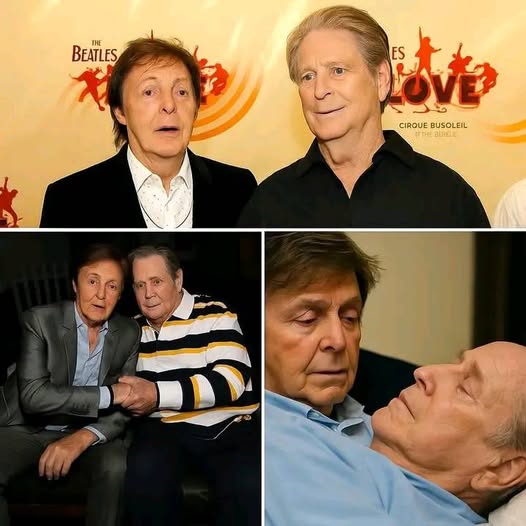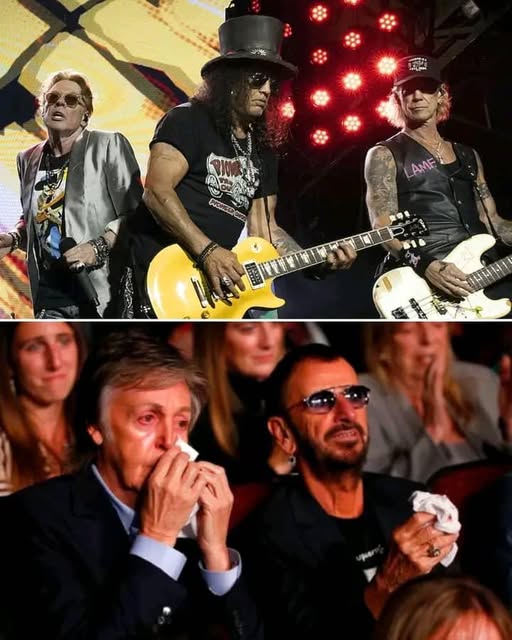💔 A Night the Music Paused to Breathe
In a world often defined by noise, spectacle, and headlines, there are moments that float above it all—quiet, intimate, unforgettable. One such moment unfolded when Paul McCartney, the living legend of The Beatles, stepped onto a dimly lit stage, sat at his piano, and offered the world a trembling, soulful tribute to Brian Wilson.
The occasion wasn’t announced with fanfare. There were no fireworks, no dramatic introductions. But what followed was more powerful than any spotlight: a performance of “Here Today”, whispered into the stillness, laden with grief, reverence, and undying affection for a fellow genius—the late Brian Wilson of The Beach Boys.
As the first notes rang out, the audience instinctively held its breath.
🎶 “Here Today”: A Song Written for Lennon, Sung for Wilson
“Here Today” is a song Paul McCartney originally penned after the tragic death of John Lennon. It’s a conversation that never happened, a regret, a love letter wrapped in sorrow. But on this night, it took on new meaning—a bridge between two of the greatest minds in music history.
Brian Wilson, who passed away just days before the tribute, had been much more than a peer to McCartney. He was an inspiration, a challenger, and perhaps, the only other composer of the 20th century who truly understood the weight of creating beauty from pain.
As McCartney sang the line “I love you,” a whisper cracked through the silence. It was as if time folded in on itself. No longer was this a song for just John. It became a eulogy for Brian, too.
🕊️ A Relationship of Notes and Nuance
The musical bond between Paul McCartney and Brian Wilson was always a thing of quiet mutual awe. They rarely appeared in public together. They didn’t need to. Their conversation happened in albums, in harmony, in the notes between the notes.
When McCartney once declared that “God Only Knows” was “the greatest song ever written,” it wasn’t flattery. It was acknowledgment. Wilson, in return, called McCartney’s melodies “unbelievable” and “heavenly.” Together, they raised the standard for pop music—melodically, lyrically, emotionally.
This tribute wasn’t just McCartney honoring a friend. It was one master acknowledging the passing of another, in the most human, humbling way possible.
🎤 The Crowd: Still, Silent, Changed
There are performances that entertain, and then there are performances that transform. This one belonged firmly in the latter category.
As McCartney’s voice trembled through “What about the time we met?”, many in the audience could be seen wiping tears from their cheeks. These weren’t just fans. They were children of a musical revolution shaped by Wilson and McCartney alike.
For those few minutes, there was no cheering, no clapping—just presence. The crowd became an extension of the piano—holding space for memory, for mourning, and for music that makes us feel.
🌊 Why It Hurt So Beautifully
Brian Wilson wasn’t just a musician. He was a man who poured his soul into everything, who battled demons and still made harmonies that felt like prayers. His struggles were well-known, his silence often misunderstood.
That’s why this moment hit harder.
McCartney didn’t just sing to honor a fellow artist. He sang to reach him—wherever he might be now. The performance seemed to say all the things that artists so rarely say to each other in life: “I saw you. I heard you. I loved you.”
🎼 An Echo Through Generations
It’s easy to think of McCartney and Wilson as monuments of a bygone era. But that’s not what this night proved. It showed that even as time moves forward, even as new sounds dominate the charts, the emotional core of true artistry remains timeless.
Teenagers in the audience cried next to their grandparents. Musicians bowed their heads. People who had never met either man walked away feeling as though they had. That’s the magic of legacy. That’s the power of truth in music.
✍️ “I Love Him”: The Line That Broke the Room
Near the song’s close, Paul leaned slightly into the microphone and, with a voice barely louder than a breeze, said: “I love him.”
There was no need for clarification. No name. Everyone knew who “him” meant.
That quiet confession—a simple sentence with the weight of decades—was the most piercing lyric of the night. Because in that moment, McCartney wasn’t a Beatle. He wasn’t a legend. He was just a friend saying goodbye.

🎥 A Moment That Belongs to Everyone
Clips of the performance began circulating within hours. Fans uploaded shaky videos. Musicians responded with covers. Tribute pages flooded social media. Not out of virality—but because grief shared is grief softened.
No words could capture the full weight of that performance. But the feeling? It was universal: we lost one of the last true poets, and another poet mourned him with a song.
💡 Social Media Captions to Spark the Feels
- “When legends grieve, the world listens. McCartney’s whispered ‘I love him’ broke all of us. 🎶💔 #PaulMcCartney #BrianWilson”
- “Not just a performance. A farewell between giants. McCartney sings ‘Here Today’ for Wilson, and the silence says everything. 🌊🎹”
- “In every note, a memory. In every word, a goodbye. Paul’s tribute to Brian is what music is all about. #HereToday #LegendsNeverDie”
🕯️ Final Thoughts: Music as Mourning, and as Medicine
Some tributes are for show. This wasn’t one of them.
This was Paul McCartney—vulnerable, stripped of bravado—using his greatest gift to process a great loss. In honoring Brian Wilson, he reminded the world what music is really for: to feel, to heal, to remember.
It wasn’t a concert moment. It was a human moment. One where the lines between artist and audience, between friend and fan, blurred into a singular truth:
Love never leaves. It only changes its melody.


